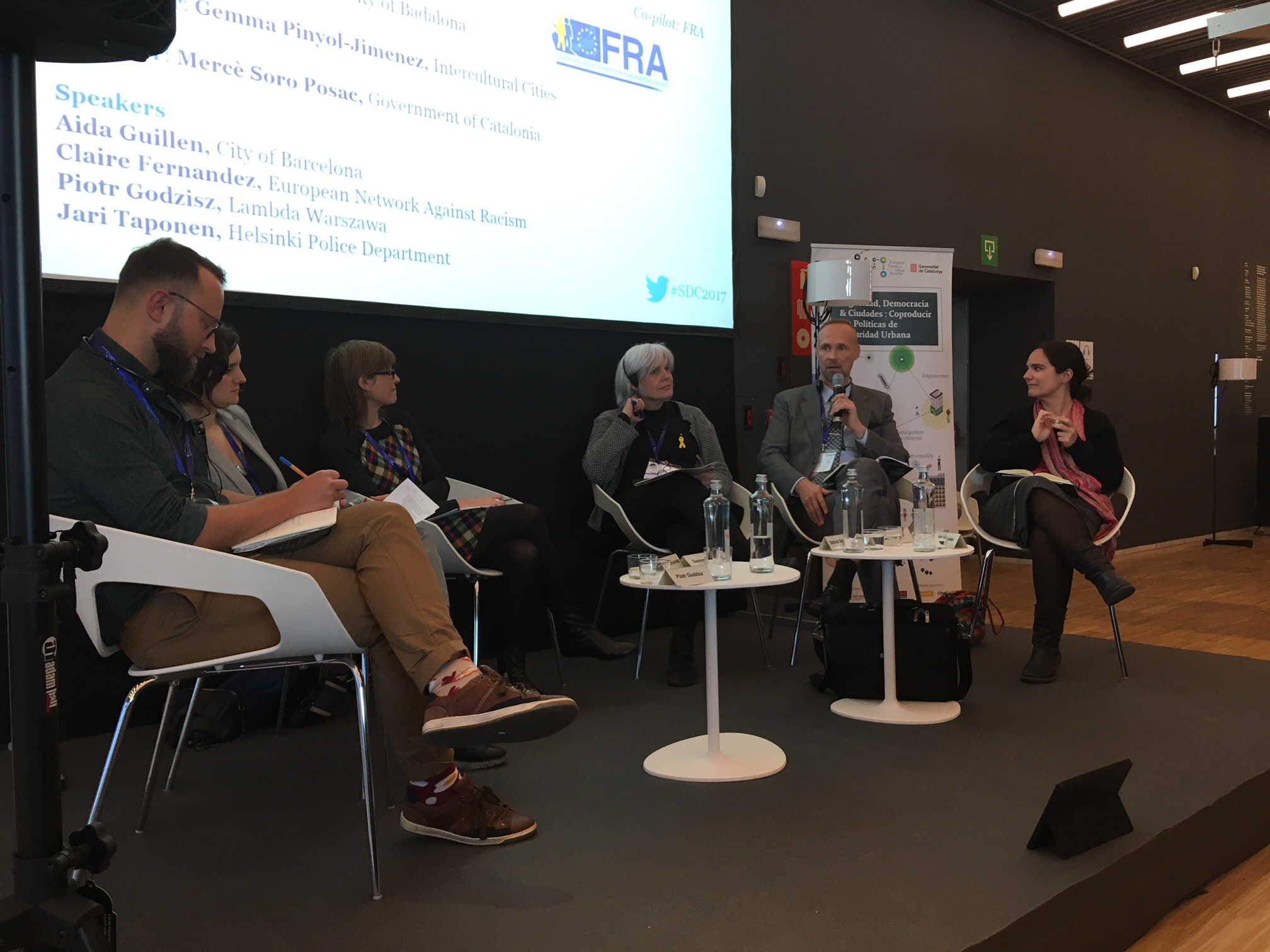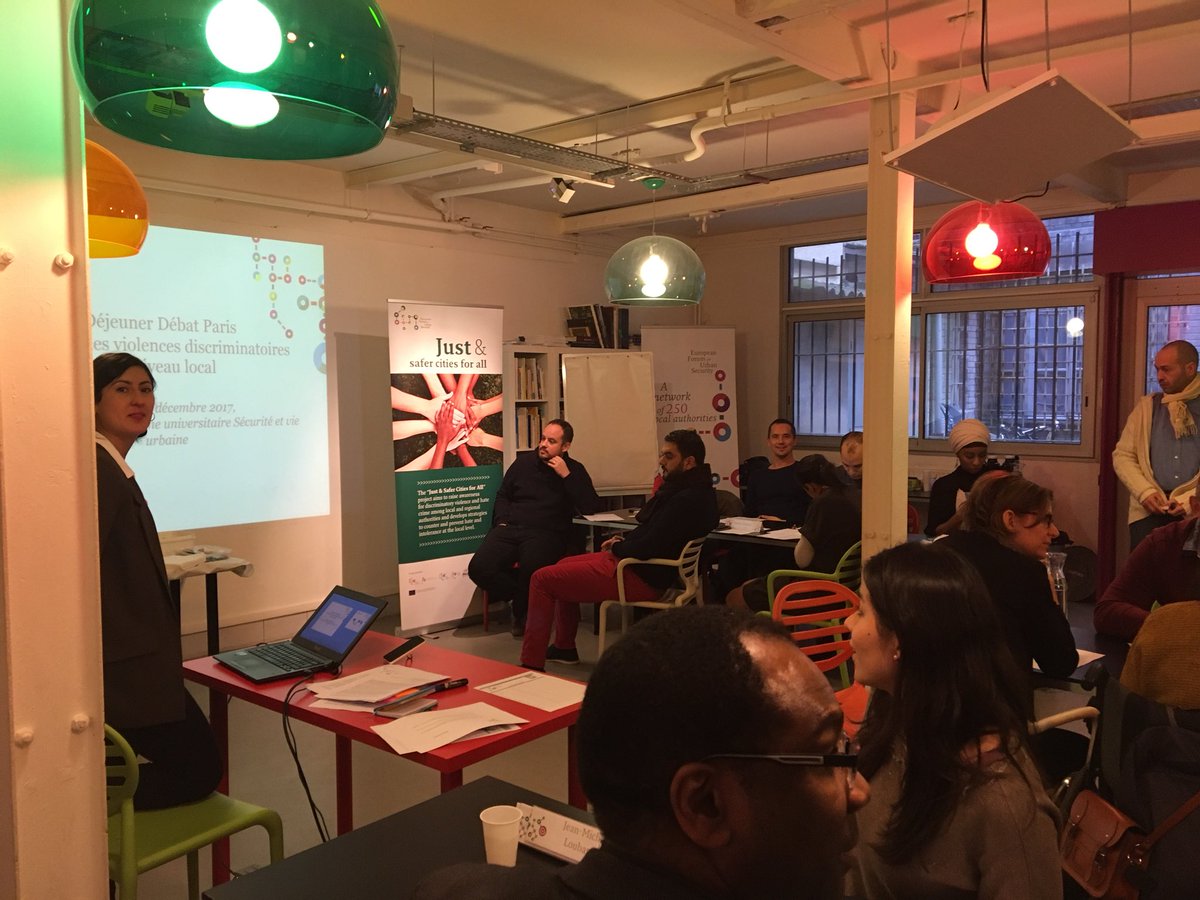Final event of the project “Just and Safer Cities for All”
Discriminatory violence workshop
Efus organised the final event of the “Just & Safer Cities for All” project on 16 November, in Barcelona (SP). Representing local and national authorities, civil society organisations, polices forces and citizens, around 90 participants from 14 European countries took part in this workshop on discriminatory violence. This event was held during Efus’ “Security, Democracy & Cities: Co-producing Urban Security Policies” international conference, organised on 15-17 November in Barcelona.
Co-organised with the support of the European Union Agency for Fundamental Rights (FRA), the workshop was divided into two sessions. In the first one, the discussion focused on the priorities to tackle the phenomena of discriminatory violence in the current context. The session was chaired by Antonio Lorenzo, Deputy Mayor of Castellón de la Plana (SP) and moderated by Niraj Nathwani from the FRA. Joanna Perry, Research Fellow and Associate Lecturer on hate crime at Birkbeck College, University of London; Maribel Ramos, Deputy Director, RAIS Foundation; Paul Giannadi, Head of the Cross-Government Hate Crime Programme at the Department for Communities and Local Government (GB) also participated in the discussion. Among the main priorities mentioned were the high levels of under-reporting, the lack of trust of victims in the police and their feeling of not being protected. .
During the second session, the discussion focused on the role of local authorities in preventing this kind of violence by creating an environment in which discrimination, hate speech and violence are not tolerated. This session was chaired by Dolorés Sabater, Mayor of Badalona, and moderated by Gemma Pinyol, Expert for Intercultural Cities at the Council of Europe. The speakers who participated in this session were: Aida Guillen, Director of Citizenship and Diversity Rights at the Barcelona City Council (SP); Claire Fernandez, Deputy Director – Programmes, European Network Against Racism (ENAR); Piotr Godzisz, Policy, Research & Advocacy Officer, Board Member of Lambda Warszawa (PL), and Jari Taponen Superintendent, Unit for Police Preventive Actions, Helsinki Police Department (FI).
Among the main conclusions are the need of local authorities to work directly with communities and vulnerable groups. NGOs, associations and communities play a complementary role to administrations in accessing vulnerable groups and victims. It is necessary to observe, assess and establish a diagnosis of what is really happening on the ground, including through observatories on discrimination. Real data help change the perception of security, which is often warped. We must also tackle the invisible discrimination, such as that which affects homeless or young people).
Recommendations on how to tackle discriminatory violence at the local level, to be included in Efus’ upcoming Manifesto, are based on all the work carried out during the events organised within the framework of the project, such as seminars, lunch debates, and meetings of Efus’ Executive Committee. It will be the first time that Efus’ “Security, Democracy and Cities” Manifesto includes the topic of discriminatory violence as one of its priorities for urban security. As a political document, the Manifesto presents the recommendations and engagements of Efus’ members for the next five years.
European seminar
Preventing and Countering Discriminatory Violence at the Local Level – 2-3 March 2017, Vienna
Lunch Debates
In the framework of the Just and Safer Cities for All project, Efus held a series of lunch debates with local elected officials, security practitioners, civil society representatives and youngsters in several European cities to discuss the prevention of discriminatory violence at the local level. The objective was to further discuss and work on recommendations for local stakeholders who wish to implement strategies to counter and prevent hate and intolerance in their localities. What should the role of local authorities be in countering discriminatory violence? What kind of action should they take to prevent it? How can cooperation with law enforcement agencies or victim support organisations be set up or improved? These questions featured prominently in the debates.
This initiative was started in Madrid (Spain) in November 2016 and continued in Vienna (Austria) in March 2017. Efus, with the contribution of the local actors who attended these events, drafted recommendations for local action to prevent discriminatory violence. The subsequent local debates, held in other cities in Europe, aimed to add to these preliminary recommendations the the contributions, perspective and points of view of local actors from different European countries.
Drafting recommendations for the upcoming Manifesto of Barcelona and Catalonia
The ultimate objective was to work towards ending discriminatory violence in European cities. The recommendations form part of the topical chapters of Efus’ Manifesto of Barcelona and Catalonia, which was adopted during Efus’ international conference, Security, Democracy & Cities: Co-producing urban security policies. This document includes principles, recommendations and the commitments of Efus member local and regional authorities for urban security.
Lunch debate in Madrid (Spain)
A first lunch debate was held on 25 November 2016 in Madrid (ES). Organised in conjunction with a seminar entitled “Hate Crimes: How to act on the local level” (“Delitos de Odio: Cómo actuar desde el ámbito local”), it brought together experts from research institutions, civil society organisations, law enforcement agencies and local authorities. Representatives from Efus as well as the Spanish Forum for Prevention and Urban Security (FEPSU) presented the Just and Safer Cities for All project and the approach towards discriminatory violence.
Discussions focused on the conceptual differences between hate crime and discriminatory violence. As the event united experts from a wide range of professions and with different fields of expertise, the variety of forms that discriminations can take was highlighted. Local strategies need to respond to very different phenomena, e.g. xenophobia, LGBT-phobia or intolerance against people with disabilities while recognising the common source of prejudice and intolerance.
Being the first lunch debate on the topic, this event helped sharpen Efus’ conceptual framework and develop the first ideas towards recommendations for the effective prevention of discriminatory violence at the local level.
…in Brno (Czech Republic)…
On September 19 2017, a lunch debate took place in Brno (CZ) in the framework of their National Crime Prevention Days. The event gathered representatives from the Probation and Mediation Service, from the cities of Brno, Brasov (RO) and Vienna (AT), academics from the University of Brno, the University of Prague, the Mendel University of Brno, the University of Bratislava (SK) and the Czech Institute of Criminology and Social Prevention.
The project and its recommendations were introduced by Pilar de la Torre, Programme Manager at Efus, and the discussion was launched by Shams Asadi, Head Commissioner for Humans Right of Vienna, who shared the experiences of her city and encouraged participants to react on the recommendations.
The discussion focused around four main issues that are particularly important for local authorities: gaining more knowledge and evidence on the real situation of vulnerable people at the local level; tackling underreporting by gaining the trust of vulnerable citizens; adopting a multidisciplinary approach and involving local actors, including representatives from minorities and civil society organisations, to identify priorities and design appropriate strategies, and lastly, tackling hate speech in social media.

…in Stuttgart (Germany)…
On October 6, another lunch debate was held in Stuttgart (DE) in the framework of the General Assembly meeting of the German-European Forum for Urban Security (DEFUS). Representatives of the cities of Augsburg, Düsseldorf, Essen, Freiburg, Gelsenkirchen, Heidelberg, Karlsruhe, Mannheim, Munich, Stuttgart, as well as from the Prevention Council of the Land of Lower Saxony (Landespräventionsrat Niedersachsen) engaged in the discussion.
Efus Programme Manager Moritz Konradi introduced the draft version of the topical recommendations. The lively debate focused on three major topics: Firstly, the participants stressed the need for improved disaggregated statistical data on different phenomena of discriminatory violence. The current lack of such data oftentimes hampers the development of effective prevention strategies and can lead to perceiving discriminatory violence as a marginal issue. Secondly, the participants stated that local authorities can provide important support to the groups affected by discriminatory violence, and many municipalities have already established specialised services and appointed officers who serve as contact points for these local communities. Thirdly, the importance of cooperation with civil society organisations was highlighted, as common efforts and coordination in prevention networks are the most promising in countering phenomena of intolerance and related forms of violence and crime.

…in Barcelona (Spain)…
On November 15 2017, the fourth lunch debate was held in Barcelona (SP), in the framework of Efus’ Security, Democracy & Cities: Co-producing urban security policies international conference. The participants were 50 youngsters from France, Germany, Spain and the Netherlands, who joined the conference in the framework of the Efus-led Security, Democracy and Youth project l, as well as the Just and Safer Cities for All project partner. The youngsters were chosen by Efus national forums as well as member cities and associations. All of the young participants are involved in municipal crime prevention activities as volunteers, interns or young professional and thus contribute to local prevention strategies on a daily basis.
During the lunch, the partners moderated a discussion on the Manifesto’s draft recommendations and the participants’ local strategies to prevent hate and intolerance. Many youngsters shared their experience with racist hate speech on social media and proposed strategies to spread alternative narratives and images through social networks such as Instagram or Snapchat. Some also highlighted sexist and homophobic discrimination, in particular in local sports activities, and proposed projects with NGOs and sports networks in order to raise awareness and support affected youngsters. They pointed out that local authorities can play a significant role in coordinating and supporting such efforts.

…and in Paris (France)
The last lunch debate was held in Paris on 8 December 2017 with around twenty students of the University Diploma in Security and Urban Life organised by the French Forum for Urban Security and the University of Saint-Quentin-en-Yvelines. This diploma is primarily intended for professionals in office who seek to acquire a high level of expertise in the field of security policies and crime prevention.
The discussions focused on the role of local and regional authorities in the conduct of a policy to combat all forms of discrimination. The students worked on a series of recommendations and highlighted the need to establish close links with third sector partners, particularly in the field of sport, which is a powerful vehicle to transmit values of social cohesion and inclusion. Participants also emphasised the importance of training professionals so that they do not themselves spread false representations or stereotypes.
Efus wishes to thank all the participants in these debates for sharing.







